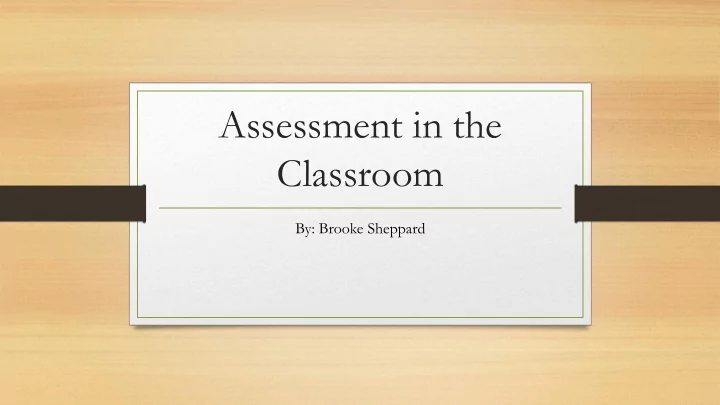

Assessment in the Classroom By: Brooke Sheppard
Take a moment and think about what the word “assessment” means to you.
What are Assessments? • According to The Glossary of Education Reform, assessments are • “… the wide variety of methods or tools that educators use to evaluate, measure, and document the academic readiness, learning progress, skill acquisition, or educational needs of students.”
How Do You Assess Learning? • Check what students already know • Compare to state or district standards • Provide a Variety of Assessments • Alternative • Assessments that are not multiple choice or one shot approaches • Authentic • Assessments that involve real-life tasks that are relevant • Performance • Assessments that involve students being observed by teachers or an audience while performing a presentation, speech, or demonstration
Why are Assessments Important? For the Student: For the Teacher: • Drives Student Learning • Adjust Teaching Strategies • Improve Performance from • Differentiating Instruction Feedback • Check for Student Understanding • Identify Strengths and Weaknesses • Reduce Achievement Gaps • Provides Involvement of Learning Between Students
Formative & Summative Assessments • Formative • Part of the instructional process • Provides students with a chance to “practice” learning goals • Checks student understanding during the learning process • Summative • Given at the end of a lesson, unit, or certain time period • Meant to gauge student learning relative to standards • Often known as High Stakes Assessments
High Stakes Assessments • Assessments in which penalties or decisions are determined by the outcomes or results of the assessment. • High Stakes Assessments decide: • School Accreditation • Graduation • Promotion of Grade Levels • Certification • Course Credit
Methods of Assessment in the Classroom Formative Summative • Exit Slips • Standardized State Assessments • Self-assessments (checklist) • District Benchmarks • One Sentence Summary • Final Projects or Performances • Thumbs Up/Thumbs Down • End of Unit Tests • Providing Feedback • Chapter Tests
Methods of Assessment in the Classroom • Discussions • Midterm Exams • Creating Brochures • Written Paper • Graphic Organizers • Creation of a Web Page
When Should You Give An Assessment? • Formative assessments should be given consistently throughout the learning process • Summative assessments should only be given at the end of a lesson or unit
How to Choose the “Right” Assessment • Determine your learning goals for students and match them to assessments • Use a variety of assessments • Formative & Summative • Authentic, Alternative, Performance • Assessment Intervals • Collecting Data Purposes
“ Learners need endless feedback more than they need endless teaching. ” -Grant Wiggins
Questions or Comments over Assessments?
References • Assessment Definition. (2015, November 10). Retrieved July 31, 2016, from http://edglossary.org/assessment/ • California State University. (2007). Choosing appropriate assessments. Retrieved August 02, 2016, from http://teachingcommons.cdl.edu/cdip/facultyteaching/Choosingappropriateassessment.html • Dodge, J. (2016). What Are Formative Assessments and Why Should We Use Them? | Scholastic.com. Retrieved August 02, 2016, from http://www.scholastic.com/teachers/article/what-are-formative-assessments-and-why-should-we-use-them • Formative vs Summative Assessment-Teaching Excellence & Educational Innovation - Carnegie Mellon University. (2015). Retrieved August 01, 2016, from https://www.cmu.edu/teaching/assessment/basics/formative-summative.html • Guskey, T. R., & Jung, L. A. (2013). Answers to essential questions about Standards, Assessments, Grading, and Reporting. Thousand Oaks, CA: Corwin Press. • Schurr, S. (2012). Authentic assessment: Active, engaging product, and performance measures. Westerville, OH: Association for Middle Level Education. • UConn Logo University of Connecticut UC Title Fallback. (n.d.). Retrieved August 02, 2016, from http://assessment.uconn.edu/why-assessment/ • Wiggins, G. (2012, August 27). Less Teaching and More Feedback? Retrieved August 2, 2016, from http://inservice.ascd.org/less-teaching-and-more-feedback/
Recommend
More recommend